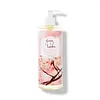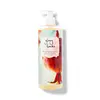What's inside
What's inside
 Key Ingredients
Key Ingredients

 Benefits
Benefits

 Concerns
Concerns

 Ingredients Side-by-side
Ingredients Side-by-side

Aloe Barbadensis Leaf Juice
Skin ConditioningRosa Centifolia Flower Water
Skin ConditioningSulfated Coconut Oil
CleansingGlycerin
HumectantCellulose
AbsorbentCitrus Aurantium Sinensis Fiber
Emulsion StabilisingCoffea Arabica Leaf/Seed Extract
MaskingCaffeine
Skin ConditioningMentha Viridis Extract
MaskingRice Ferment Filtrate
Skin ConditioningBiotin
AntiseborrhoeicNiacinamide
SmoothingCamellia Sinensis Leaf Extract
AntimicrobialPanax Ginseng Extract
AntioxidantLavandula Angustifolia Flower
Skin ConditioningMentha Citrata Herb Oil
PerfumingLonicera Caprifolium Extract
AstringentVinegar
Curcumin
AntioxidantAloe Barbadensis Leaf Juice, Rosa Centifolia Flower Water, Sulfated Coconut Oil, Glycerin, Cellulose, Citrus Aurantium Sinensis Fiber, Coffea Arabica Leaf/Seed Extract, Caffeine, Mentha Viridis Extract, Rice Ferment Filtrate, Biotin, Niacinamide, Camellia Sinensis Leaf Extract, Panax Ginseng Extract, Lavandula Angustifolia Flower, Mentha Citrata Herb Oil, Lonicera Caprifolium Extract, Vinegar, Curcumin
Aloe Barbadensis Leaf Juice
Skin ConditioningRosa Centifolia Flower Water
Skin ConditioningSulfated Coconut Oil
CleansingAlgae
Skin ConditioningCollagen
MoisturisingGlycerin
HumectantCellulose
AbsorbentCitrus Aurantium Sinensis Fiber
Emulsion StabilisingHippophae Rhamnoides Extract
MaskingVinegar
Biotin
AntiseborrhoeicCamellia Sinensis Leaf Extract
AntimicrobialPyrus Malus Fruit
AstringentZingiber Officinale Root
Skin ConditioningRice Ferment Filtrate
Skin ConditioningCucumis Sativus Fruit
Skin ConditioningRosmarinus Officinalis Leaf
Skin ConditioningUrtica Dioica
Parfum
MaskingLonicera Caprifolium Extract
AstringentAloe Barbadensis Leaf Juice, Rosa Centifolia Flower Water, Sulfated Coconut Oil, Algae, Collagen, Glycerin, Cellulose, Citrus Aurantium Sinensis Fiber, Hippophae Rhamnoides Extract, Vinegar, Biotin, Camellia Sinensis Leaf Extract, Pyrus Malus Fruit, Zingiber Officinale Root, Rice Ferment Filtrate, Cucumis Sativus Fruit, Rosmarinus Officinalis Leaf, Urtica Dioica, Parfum, Lonicera Caprifolium Extract
Ingredients Explained
These ingredients are found in both products.
Ingredients higher up in an ingredient list are typically present in a larger amount.
Aloe Barbadensis Leaf Juice comes from leaves of the aloe plant. Aloe Barbadensis Leaf Juice is best known for helping to soothe sunburns. It is also anti-inflammatory, moisturizing, antiseptic, and can help heal wounds.
Aloe is packed with good stuff including Vitamins A, C, and E. These vitamins are antioxidants, which help fight free-radicals and the damage they may cause. Free-radicals are molecules that may damage your skin cells, such as pollution.
Aloe Barbadensis Leaf Juice also contains sugars. These sugars come in the form of monosaccharides and polysaccharides, folic acid, and choline. These sugars are able to help bind moisture to skin.
It also contains minerals such as calcium, 12 anthraquinones, fatty acids, amino acids, and Vitamin B12.
Learn more about Aloe Barbadensis Leaf JuiceBiotin is a B vitamin that is naturally produced by our bodies. It is also called Vitamin H.
Our bodies use biotin in the metabolism process. It also helps our bodies use enzymes and move nutrients around. A biotin deficiency can lead to brittle hair and nails.
More research is needed on applying biotin topically. However, taking biotin orally has been shown to help nourish the skin, hair, and nails. They play a role in forming skin-hydrating fatty acids.
Biotin is water-soluble. It can be found in foods such as fish, eggs, dairy, nuts, and meat. Vitamin H stands for "haar" and "haut". These are the German words for hair and skin.
Learn more about BiotinCamellia Sinensis Leaf Extract is derived from the leaves of the tea plant. Black tea, green tea, and oolong tea are all harvested from this plant.
This ingredient has many skin benefits:
This ingredient contains polyphenols, a strong antioxidant. Antioxidants help fight off molecules that damage skin cells.
On top of that, the antioxidants in green tea neutralize free-radicals from the sun. This gives the skin some extra UV protection, but should not replace sunscreen.
Many components of tea have anti-inflammatory properties.
Polyphenols and L-theanine help soothe the skin and reduce irritation. The caffeine in Camellia Sinensis Leaf Extract helps calm inflamed blood vessels.
Other compounds found in tea include: Vitamin Bs, linoleic acid, magnesium, calcium, iron, and zinc.
Research has shown both drinking Camellia Sinensis Leaf Tea and applying it to the skin can help boost skin elasticity and hydration. Studies also show using tea extract may reduce sebum, or oil, production.
Learn more about Camellia Sinensis Leaf ExtractCellulose is the main component of plant cell walls. It is used as an emulsifier, absorbent, and texture enhancer.
This ingredient has many functions:
Fun fact: Cellulose is the most abundant form of organic polymer on Earth.
Learn more about CelluloseWe don't have a description for Citrus Aurantium Sinensis Fiber yet.
Glycerin is already naturally found in your skin. It helps moisturize and protect your skin.
A study from 2016 found glycerin to be more effective as a humectant than AHAs and hyaluronic acid.
As a humectant, it helps the skin stay hydrated by pulling moisture to your skin. The low molecular weight of glycerin allows it to pull moisture into the deeper layers of your skin.
Hydrated skin improves your skin barrier; Your skin barrier helps protect against irritants and bacteria.
Glycerin has also been found to have antimicrobial and antiviral properties. Due to these properties, glycerin is often used in wound and burn treatments.
In cosmetics, glycerin is usually derived from plants such as soybean or palm. However, it can also be sourced from animals, such as tallow or animal fat.
This ingredient is organic, colorless, odorless, and non-toxic.
Glycerin is the name for this ingredient in American English. British English uses Glycerol/Glycerine.
Learn more about GlycerinThis ingredient is derived from parts of the Italian honeysuckle plant. It has astringent, antioxidant, and antimicrobial properties.
Honeysuckle has a natural fragrance.
Learn more about the benefits of Italian honeysuckle here.
Learn more about Lonicera Caprifolium ExtractRice Ferment Filtrate is created by fermenting rice, or oryza sativa. A common name for this ingredient is sake, the traditional Japanese fermented rice alcoholic beverage.
Rice ferment is skin-conditioning and contains anti-aging components.
Rice contains numerous antioxidants which may help with anti-aging, such as vitamin E. Antioxidants help stabilize free-radical molecules. Unstable free-radical molecules may damage your skin cells and accelerate signs of aging.
A study from 2013 found fermented rice water to help decrease sun damage by increasing collagen production.
Learn more about Rice Ferment FiltrateWe don't have a description for Rosa Centifolia Flower Water yet.
Sulfated Coconut Oil is a type of sulfate, is an oil, and isn't fungal acne safe. It can be bad for oily skin, be bad for acne prone skin, and cause irritation.
In cosmetics, vinegar is often used to help adjust the pH of a product. It is also a light exfoliant. The pH of your skin is important to maintain a healthy skin barrier.
Vinegar is created by the process of double-fermentation. It is an aqueous solution consisting mostly of water and acetic acid. Typically, vinegar contains anywhere from 5-8% acetic acid.
Other components include small amounts of contains small amounts of tartaric acid and citric acid. Depending on what is used to ferment the vinegar, it can have traces of flavoring as well.
Learn more about Vinegar